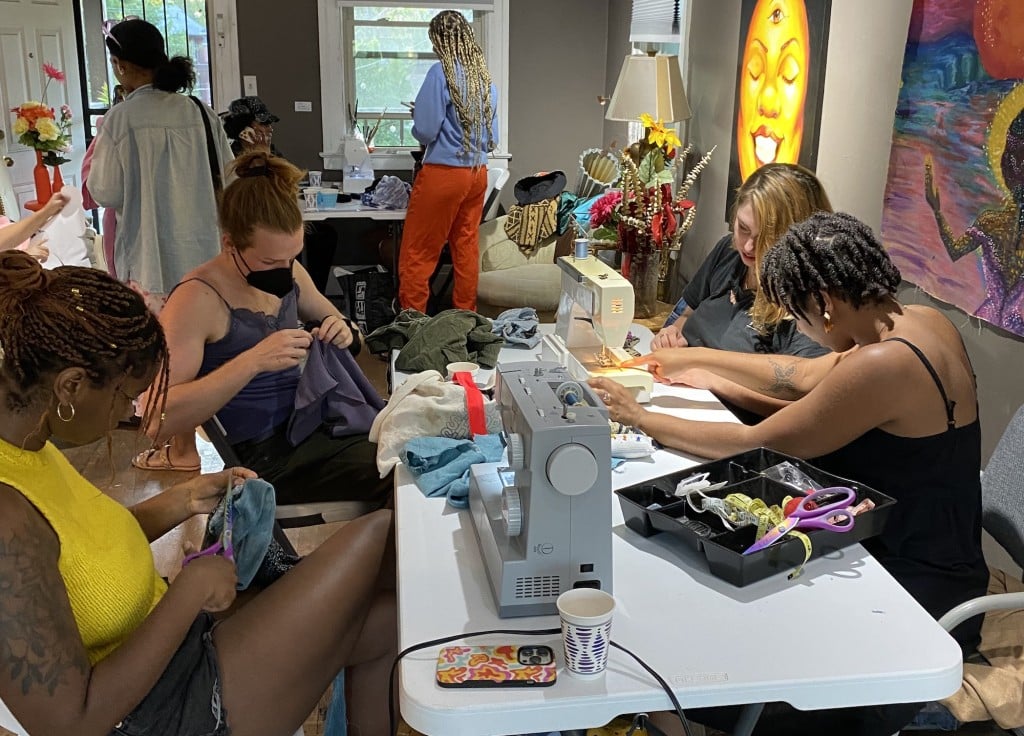
Do you have clothing hanging in your closet that you don’t wear because it needs a slight alteration? Or maybe, instead of sewing a hole in a T-shirt, you put it in a bag to go to Goodwill or Salvation Army.
You’re not alone. The culture of fast fashion has made it easy for consumers to buy and discard cheap apparel that still has a lot of life left in it. But in Detroit, two artists are using clothing swaps and sewing as acts of environmentalism.
The Irwin House Gallery in Detroit usually displays paintings and fine art, but one day this fall, it hosted a community event focused on upcycling and repurposing clothes. On the first floor, people set up for a closwap to trade their used clothes and accessories for new-to-them items.
Participants filled racks with clothing, purses, and jewelry to barter. Half a dozen women sat behind sewing machines on the gallery’s second floor, mending and altering garments.
As people arrived with bags of clothing, shoes, and jewelry, they were greeted by Halima Cassells, a well-known interdisciplinary Detroit artist and co-organizer of the event.

“If you need things sewn, go to the second floor, and feel free to grab a cookie on your way up,” Cassells told new arrivals.
Cassells said clothing swaps are an excellent way to refresh one’s wardrobe and an act of environmentalism. She founded Free Market of Detroit, a nomadic closwap meet-up, a decade ago when her daughter was born.
“I didn’t really have clothes for a one to two-year-old, so I decided to invite some friends and cousins over and see who had stuff to pass on,” Cassells says. “We had 13 bags of stuff, two strollers, two car seats. And it just made me think, like, ‘Wow, we have so much wealth, and people are happy to give it away.’”
Free Market of Detroit is an idea exchange marketplace where people can teach each other and learn from each other. The group sets up at community spaces across the city and hosts alterations and upcycling workshops, impromptu fashion shows, and dance parties.
With a swap-till-you-drop attitude, Cassells believes “there [is] more than enough clothing in circulation.”
“We don’t really have to be buying fast fashion clothes just because something is ripped or doesn’t fit quite right,” Cassells said. “I feel like if more people felt empowered… we could stem the tide of all of the waste that’s produced.”
Looking over the fit of a just-altered denim skirt was Sarah Mark, a fiber artist and founder of the community-based Neighborhood Art School on Clairmount. The school brings artists and educators together to teach in-person and online classes. She helped organize this event because she’s passionate about sustainable fashion.


RIGHT: Sarah Mark works on her textile art project at the Neighborhood Art School. Photos by Nick Hagen.
These community meet-ups are designed to raise consciousness about a global problem we all participate in. The culture of fast fashion started in the ’90s and has completely changed how consumers purchase clothes. Stores like H&M and Zara focused on affordable, trendy clothing and infiltrated the American market. Companies saved millions of dollars by outsourcing the labor of textile mills to developing countries.
To Mark, clothes swapping is about more than just sewing.

“This is a climate justice movement,” she said. “We’re developing a sustainable fashion-focused educational program. Things like this can happen in our space and other spaces like this one.”
Read all stories in our series Inside Detroit’s circular fashion economy.
